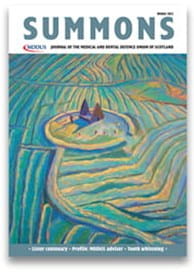ASYLUM seekers and undocumented migrants pose a growing challenge to local healthcare resources across the UK. In a recent article published in the BMJ Dr Paquita de Zulueta made a heart-felt plea to medical colleagues to "overcome bureaucratic barriers and register patients irrespective of their residential status."
She likened some of the vulnerable people she sees as a GP and clinical volunteer for a health advocacy programme in London as "Dante’s lost souls", trapped in a bureaucratic limbo. "Many of them have not sought medical help for several years despite serious medical problems, some brought on by the lives they lead or the trauma they have experienced."
MDDUS often receives calls from doctors and dentists in regard to their obligations toward asylum seekers and refugees. Are they obligated to register such patients? Should practices check the immigration status of patients wanting to join their lists? What about patients who have been refused asylum and/or are living in the UK illegally?
No doubt these questions cross over into the ethical duties of healthcare professionals towards patients. It is a bedrock principle that doctors and dentists have a duty of care to all people seeking healthcare. But what does the law require?
Earlier this month the BMA issued a helpful guidance document on access to healthcare for asylum seekers and refused asylum seekers. Among first principles in the document was the view that doctors should not be expected to police the eligibility of patients for free NHS care.
NHS regulations in all four devolved health administrations allow for asylum seekers and refugees to register with a GP and to receive free NHS hospital treatment. GP practices also retain the discretion to register refused asylum seekers to the same extent they can register any patient regardless of residency status.
The BMA guidance states: "Practices are not required to check the identity or immigration status of people registering to join their lists and there is no obligation on prospective patients to provide evidence in this regard. There may be practical reasons why GP practices might want to confirm the identity of patients registering at a practice but practices must ensure that any requests for identification are asked of all patients who register to avoid discrimination."
Refusal to register asylum seekers and refugees must be on "reasonable grounds" just as with any patient to avoid being judged discriminatory. This might include an oversubscribed practice which has closed its list to new applicants but even in this circumstance GPs are still obliged to provide any treatment considered to be "immediately necessary".
The GMC in Good Medical Practice makes no specific reference to asylum seekers and refugees but under the duties of the doctor it states that you must "make the care of your patient your first concern" and "never discriminate unfairly against patients or colleagues". Later in the section on decisions about access to medical care it further states: "You must give priority to the investigation and treatment of patients on the basis of clinical need, when such decisions are within your power".
Similar professional principles apply to dentists. The GDC in its Standards for dental professionals states: "Treat patients fairly and in line with the law. Promote equal opportunities for all patients. Do not discriminate against patients or groups of patients because of their sex, age, race, ethnic origin, nationality, special needs or disability, sexuality, health, lifestyle, beliefs or any other irrelevant consideration."
Entitlement to free hospital care is subject to different legislation than that of primary care and each of the devolved nations has its own regulations based on whether a patient is "ordinarily resident" in the UK. This would normally cover patients entering the UK as asylum seekers but not those who have been refused asylum or are living illegally in the UK – though some NHS services are free to all patients irrespective of residency status, including accident and emergency services and the treatment of certain communicable diseases (measles, tuberculosis and pandemic flu) and sexually transmitted diseases (for HIV and AIDS, only immediate diagnosis and counselling).
But it is the view of the BMA that no doctor should be asked to make judgments as to the eligibility of patients for NHS care. Such assessments should be made by other non-clinical staff, such as an overseas visitors manager (OVM).
No doubt refugees and asylum seekers can bring many added challenges to general practice surgeries and other treatment centres – not only language and cultural barriers but also social and psychological problems associated with their plight. However, making judgements on eligibility to necessary treatment should not be a primary concern of doctors faced with sick patients. Indeed MDDUS has defended cases on behalf of members where refusing or delaying treatment on the basis of eligibility has led to claims of negligence.
In short MDDUS advice is to prioritise the treatment of patients on the basis of need rather than considerations of legal eligibility.
Jim Killgore is editor of MDDUS Summons
This page was correct at the time of publication. Any guidance is intended as general guidance for members only. If you are a member and need specific advice relating to your own circumstances, please contact one of our advisers.
Read more from this issue of Insight

Save this article
Save this article to a list of favourite articles which members can access in their account.
Save to library